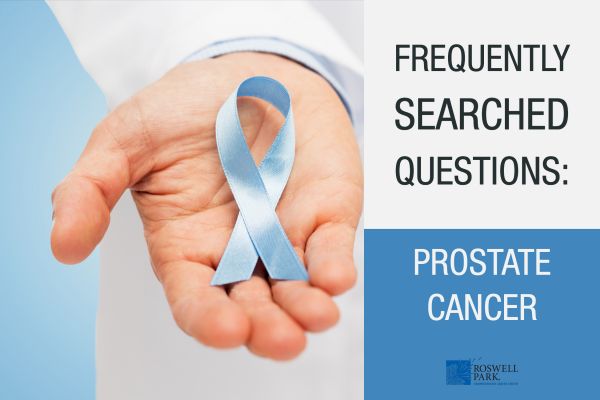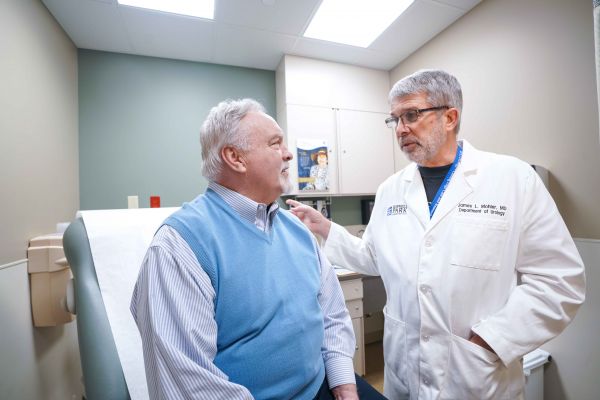Answers to your questions about sex, incontinence, fertility and more
If your medical team determines that your prostate cancer has become aggressive and needs to be treated, an operation called radical prostatectomy — removal of the prostate — is typically the first-line treatment. This surgery removes the prostate gland and surrounding tissues such as the seminal vesicles and sometimes nearby lymph nodes.
Minimally invasive techniques — and most commonly, robot-assisted surgery — help speed recovery after radical prostatectomy, since they cause less blood loss, less pain and shorter hospital stays. At Roswell Park, 100% of radical prostatectomies are performed with robot assistance. Regardless of how the operation is performed, the potential for lingering side effects — urinary incontinence and erectile dysfunction — must be considered as you decide on your treatment.
“The good news is that not all men experience these,” says Roswell Park urologist James Mohler, MD, Associate Director and Senior Vice President, Translational Research. “And for most of the men who do, these effects are temporary.” Here are answers to some of the most common questions men have about recovering from radical prostatectomy.
How Long Will Recovery Take?
You will likely spend one night in the hospital after the operation and then be discharged home with a urinary catheter in place for seven to 10 days. “The catheter is not painful, but may feel uncomfortable,” says Dr. Mohler. “Many men can barely tell they’ve had an operation except for the catheter.” Restrictions are similar to other pelvic surgery: no lifting more than five pounds for six weeks. No straining to lift for six months. Men can resume sex and activities such as walking or swimming immediately. More strenuous exercise should wait at least six weeks.
Will I Be Incontinent?
Some patients have full urinary control as soon as the catheter is removed. Most patients experience some urinary leakage, which clears up in an average of three weeks but can take as long as 18 months. Small incontinence pads may be worn during this time to absorb any leaking urine and protect your clothing. For one out of 20 men, leakage may persist longer or even be permanent.
“We define incontinence as needing more than two pads a day,” says Dr. Mohler. “Four out of five men won’t need any pads at all. One in five will need one to two mini pads per day. One in 100 will end up needing more than two pads per day. This has a devastating effect on quality of life for these men. We don’t fully understand why this happens, and we cannot predict who will have this experience.” Strengthening the pelvic floor muscles with Kegel exercises before and after your operation may help you avoid or recover from problems with urinary control.
Will I Have Erectile Dysfunction?
Whether or not you experience erectile dysfunction after radical prostatectomy will depend largely on your age, your health and what your erections were like before the operation. This side effect may occur if nerves were injured during the operation.
There are two main nerves running through the pelvis that branch into many nerves covering the prostate. Urologists call them neurovascular bundles because they really are bundles of many nerves. “Urologists always aim for nerve-sparing surgery, and we rarely need to remove the neurovascular bundles. But sometimes the bundles are stretched and some of the thousands of nerve fibers within an individual nerve can be damaged,” says Mohler. “In most men, both neurovascular bundles can usually be spared. If the cancer is advanced, sometimes one or both cannot be.”
Benefits of Robotic Radical Prostatectomy
Have more questions about radical prostatectomy? Our experts give you the answers.
Learn MoreNerve regrowth is slow, so if you experience this side effect, regaining function typically takes six to 12 weeks, but it can take longer. Most men see rapid improvement over the first 18 months, and then slower improvement for as long as the next four years.
Will I Be Able to Father Children?
No. Radical prostatectomy removes the seminal vesicles, the glands that produce and store much of the fluid that makes up semen. (The prostate produces some of this fluid, too.) All men will become infertile. You should consider in advance whether you plan to have children in the future and can choose to bank sperm before your operation. Because you will no longer produce semen, you will have what’s called a “dry orgasm.” While you can still achieve orgasm, there will not be any ejaculate. “Having a prostatectomy is the same as having a vasectomy with regard to fertility,” notes Dr. Mohler.
When Should I Begin Radiation Therapy?
For about 30% of men who undergo radical prostatectomy, the operation alone is not curative because some cancer cells had already spread outside the prostate before it was removed. For these men, the next step is likely radiation therapy to the area where the prostate used to be. However, Dr. Mohler cautions against beginning radiation treatment too soon after radical prostatectomy. “You need to be fully healed and have regained urinary control, because radiation can cause scarring that might hamper that,” he says. “Most men should not begin radiation earlier than six months after the operation; waiting 12 months is preferable, and 18 months is best. But at the same time, we’re also monitoring the PSA level, and you’ll want to begin radiation before the PSA reaches 0.5 ng/mL, and definitely before it’s increased above 1.
“If you’re considering treatment for your prostate cancer, the bottom line is that you do not need to rush your decision. Prostate cancer grows slowly, even when aggressive. Prostate cancer is neither lung cancer nor pancreatic cancer nor leukemia. You have time to stop, get educated and arrive at a treatment decision that’s right for you.”



